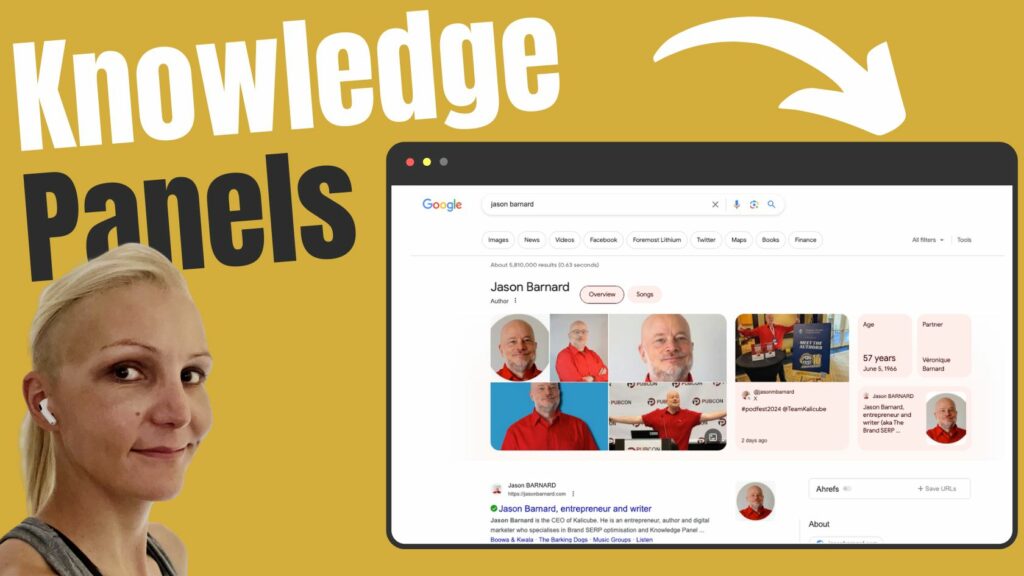What is a Google knowledge panel? How to get a Google knowledge panel? Learn all about Google knowledge panels in this in-depth interview with Jason Barbard, the Brand SERP guy.
In an insightful interview, Jason Barnard explains everything you need to know about Knowledge Panels.
Having spent over a decade focused on optimizing brand SERP results, Jason coined the term “Brand SERP” early on to describe the full search results page for branded entities. He recognized the potential in optimizing entity search visibility before most.
Now, he shares his wisdom to demystify Knowledge Panels for those new to leveraging online entities and identity signals to improve search performance.
In this beginner’s guide, Jason covers what Knowledge Panels are, how they work, common pitfalls to avoid, and strategic tips to master them based on learnings across his 20+ year SEO career.

Follow SEO Podcast by #SEOSLY
You can subscribe to the SEO Podcast by #SEOSLY on popular podcast platforms.
Google Knowledge Panels with Jason Barnard (video)
I record both the audio and the video version of each episode. Here is the video version for you.
Here is the followup event with LIVE questions and answers about Google Knowledge Panels.
And here is the replay of another LIVE Q & A with Jason Barnard. This episode was all about Google Knowledge Panels for noobs.
Google Knowledge Panels with Jason Barnard (audio)
You can listen to this episode of the SEO Podcast by #SEOSLY below.
And here is the audio version of the followup event with LIVE questions and answers about Google Knowledge Panels.
And here is the replay of another LIVE Q & A with Jason Barnard. This episode was all about Google Knowledge Panels for noobs.
Google Knowledge Panels (written guide)
Here is an expanded beginner’s guide to Google Knowledge Panels with more details.
What are Google Knowledge Panels?
Google Knowledge Panels (also called entity cards) are boxes that appear on the right-hand side of search results when you look up entities like people, places, companies, products, etc.
They provide a snapshot summary of key facts about that entity so you don’t have to click through to websites to find basic details. Knowledge panels allow you to quickly get an overview of an entity to determine if it’s the specific person, place or thing you were searching for.
For example, if you search for “Olga Zarr” in Google, you may see a knowledge panel on the right with her name, profession, company, links to social profiles like Twitter and LinkedIn, associations with other entities, and other factual details about her.
The goal of these panels is to give you enough contextual information to recognize if this is the specific Olga Zarr you wanted or help narrow it down.
How do Knowledge Panels work?
Knowledge panels are powered by Google’s Knowledge Graph, which is its knowledge base capturing real-world entities, their attributes, and how they connect to other entities.
So behind the scenes, the Knowledge Graph structures data about entities and their relationships. It understands Olga Zarr is a person, who has founded the company SEOSLY. Jason Barnard is a person who founded the company Kalicube. Kalicube and SEOSLY would be considered related entities.
When you search for “Olga Zarr” or “Kalicube,” Google references its knowledge base and returns key facts in a knowledge panel to supplement regular web search results.
The better Google’s machine understanding of an entity, the richer the knowledge panel can be. Explicit comprehension based on reliable sources leads to more trusted, informative panels vs. ones based on guessing.
The confidence level Google has in its facts about an entity also determine if a knowledge panel appears and how detailed it is. Higher confidence leads to rendered knowledge panels more frequently.
How to get a Google Knowledge Panel
Here are typical steps brand experts recommend to trigger a knowledge panel for an entity:
- Identify your central, canonical entity home page on your website – This hub page dedicated to the entity should have nicely written, descriptive information about them as well as structured data markup communicating facts about them. Optimize this page to help search engines comprehensively understand your entity.
- Craft an informative text description introducing who you are, what you do, who you help – Check how clearly Google comprehends your identity and activities using Natural Language Processing tools. Refine the description so knowledge panels represent you accurately.
- Get social media profiles for the entity and correct info across platforms – Ensure names, bios, links and data are consistent referencing your site. This helps corroborate facts about you across sources.
- Add supporting structured data (schema markup) to your entity home page linking out to proof sites also identify you like profiles, publications about you, etc. Knowledge panels pull data from schema on your site and check it matches reliable sources around the web related to you.
- Monitor and maintain the knowledge panel over time – your online presence and digital ecosystem evolve, so track new credible sites mentioning you to expand the knowledge base about you. Communicate consistently across platforms as an authoritative figure Google can trust on your entity.
Common mistakes are spamming knowledge panels with misleading information that gets deleted or claimed prematurely with sparse data. Having panels removed severely hurts future success triggering them. Work methodically over 6-12 months to convincingly establish your identity online.
Frequently Asked Questions (FAQs) on Google Knowledge Panels
Here are the most often asked questions about Google knowledge panels.
What are Google Knowledge Panels?
Knowledge Panels are boxes of entity information that can appear to the right of search results when searching for things like people, places, organizations, events, etc.
What’s the difference between the Knowledge Panel and the Knowledge Graph?
The Knowledge Graph is Google’s knowledge base that understands real-world entities and their relationships. The Knowledge Panel displays information from the Knowledge Graph for specific entities in a box on search engine results pages.
What types of entities can have Knowledge Panels?
Knowledge Panels can display information for people, places, organizations, events, books, movies, television shows, music albums, products, and more types of defined entities.
Where do Knowledge Panels get their information?
Knowledge Panels are powered by pulling facts about entities from various data sources like Wikipedia, Wikidata, Schema markup on sites, other third party databases, and information Google crawls from across the web.
How frequently are Knowledge Panels updated?
Knowledge Panels can update whenever Google crawls or indexes new data for that entity, when there’s a Knowledge Graph update, or when you provide new structured data to Google either directly or on pages it crawls.
Why don’t some entities have Knowledge Panels when you search?
If Knowledge Graph’s confidence is low in its facts on an entity, or there isn’t enough interesting information to share yet, it may not show a Knowledge Panel. They require time and reputable sources to render.
How do you get a Knowledge Panel?
Creating an entity home page offering descriptive info on who you are, adding schema markup, linking to social profiles, and ensuring consistency across quality mentions of you online over 6+ months is key to signaling your entity identity to Google.
Can you influence the content in Knowledge Panels?
Yes, by providing and promoting reputable structured data about your brand across the web and correcting inaccurate facts on sites that influence Knowledge Graph’s information about you.
Are there guidelines for what can and cannot appear in Knowledge Panels?
Google wants them to offer helpful, factual context – not promotional content or inappropriate collections of data that don’t fit the entity narrative Google determines most useful to searchers.
Why is it hard to replace outdated Knowledge Panel information?
Maintaining consistency over time and across the web solidifies your entity identity. If Google’s comprehension of you is very settled, changing that understanding requires resoundingly clear signals and patience as it re-evaluates your updated story.
Can competitors get unearned Knowledge Panels through black hat techniques?
Unfortunately yes – many spam methods that ultimately lead to penalization still briefly spoof Google into showing misleading Knowledge Panels not truly representative of the actual entity.
Do Knowledge Panels put small brands at a disadvantage?
They can if competitors have had more time and resources to establish entity strength. Use Knowledge Panels as roadmaps illustrating authority signals to pragmatically make progress.
Is featured snippet content connected to Knowledge Panels?
Featured snippets currently don’t exchange entity information with Knowledge Panels, but they similarly tap keyword and page understanding, signaling opportunity searching long-tail queries.
Can my site content be used in competitors’ Knowledge Panels?
Potentially – Google aims to present the most accurate information to searchers. Reputable sites with expertise on an entity can contribute facts reflected in its Knowledge Panel, appropriately sourced.
How often do the Knowledge Panel features expand?
Knowledge Panels evolve constantly as Google observes useful patterns. Expect gradual sideways growth introducing modules like images, maps, carousels connecting related entities, social links, etc to expose relevant variety.
Follow Jason Barnard & check his knowledge panel resources:
- Knowledge Panel FAQs: https://kalicube.com/learning-spaces/faq/knowledge-panels/
- Knowledge Panel Case Studies: https://kalicube.com/case-studies/knowledge-panel/
- Kalicube’s Knowledge Panel Checklist: https://solutions.kalicube.com/knowledge-panel-checklist
- Book: https://www.brandserpsforbusiness.com/
- Courses: https://kalicube.academy/
- A simple explanation of the Kalicube Process: https://kalicube.com/learning-spaces/faq/digital-pr/the-kalicube-process/
Make sure to subscribe to my SEO newsletter to stay fully informed and be notified when a new episode comes out.
You can subscribe to my newsletter using the form below.
Want to become a guest or provide ideas for the show?
If you want to become a guest on the show or you want to share ideas, feel free to contact me. I will be happy to hear from you. Contact me at [email protected].
